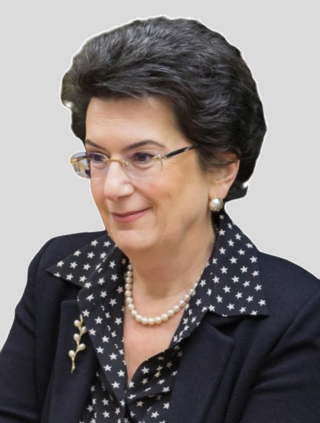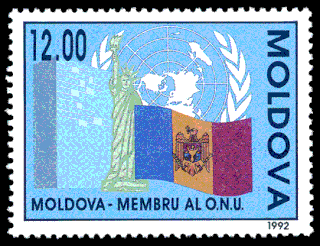
Beginning in late 2002 and continuing after the 2003 invasion of Iraq, large-scale protests against the Iraq War were held in many cities worldwide, often coordinated to occur simultaneously around the world. After the biggest series of demonstrations, on February 15, 2003, New York Times writer Patrick Tyler claimed that they showed that there were two superpowers on the planet: the United States and worldwide public opinion.

Nino Burjanadze is a Georgian politician and lawyer who served as Chairperson of the Parliament of Georgia from November 2001 to June 2008. As the first woman, she has served as the acting head of state of Georgia twice; the first time from 23 November 2003 to 25 January 2004 in the wake of Eduard Shevardnadze's resignation during the Rose Revolution, and again from 25 November 2007 to 20 January 2008, when Mikheil Saakashvili stepped down to rerun in the early presidential elections. She withdrew into opposition to Saakashvili as the leader of the Democratic Movement-United Georgia party in 2008. In October 2013, she ran in the presidential election, competing against 22 candidates. She ended third with 10 percent of the vote.

Student activism or campus activism is work by students to cause political, environmental, economic, or social change. In addition to education, student groups often play central roles in democratization and winning civil rights.

The colour revolutions were a series of often non-violent protests and accompanying changes of government and society that took place in post-Soviet states and the Federal Republic of Yugoslavia during the early 21st century. The aim of the colour revolutions was to establish Western-style liberal democracies. They were primarily triggered by election results widely viewed as falsified. The colour revolutions were marked by the usage of the internet as a method of communication, as well as a strong role of non-governmental organizations in the protests.

On 15 February 2003, a coordinated day of protests was held across the world in which people in more than 600 cities expressed opposition to the imminent Iraq War. It was part of a series of protests and political events that had begun in 2002 and continued as the invasion, war, and occupation took place. The day was described by social movement researchers as "the largest protest event in human history".

The protests of 1968 comprised a worldwide escalation of social conflicts, which were predominantly characterized by the rise of left-wing politics, anti-war sentiment, civil rights urgency, youth counterculture within the silent and baby boomer generations, and popular rebellions against state militaries and bureaucracies.

In 2007, a series of anti-government protests took place across Georgia. The demonstrations peaked on 2 November 2007, when 40,000–50,000 rallied in downtown Tbilisi, the capital of Georgia. People protested against the allegedly corrupt government of president Mikheil Saakashvili. Protests triggered by detention of Georgian politician Irakli Okruashvili on charges of extortion, money laundering, and abuse of office during his tenure as defense minister of the country were organized by the National Council, an ad hoc coalition of ten opposition parties, and financed by the media tycoon Badri Patarkatsishvili. Demonstrations occurred both in September and November 2007 and were initially largely peaceful. The protests went downhill by 6 November 2007, but turned violent the next day when the police, using heavy-handed tactics, including tear gas and water cannon, unblocked Rustaveli Avenue, Tbilisi's main boulevard, dislodged the protesters from the territory adjoining to the House of Parliament, and prevented the demonstrators from resuming the protests. The government accused the Russian secret services of being involved in an attempted coup d'état and declared a nationwide state of emergency later that day which lasted until 16 November 2007.

A series of anti-government riots took place in Armenia following presidential elections held on 19 February 2008. Protests broke out in the Armenian capital Yerevan, organized by supporters of presidential candidate and former president Levon Ter-Petrosyan and other opposition leaders.

Protests against the April 2009 Moldovan parliamentary election results began on 6 April 2009 in major cities of Moldova before the final official results were announced. The demonstrators claimed that the elections, which saw the governing Party of Communists of the Republic of Moldova (PCRM) win a majority of seats, were fraudulent, and alternatively demanded a recount, a new election, or resignation of the government. Similar demonstrations took place in other major Moldovan cities, including the country's second largest, Bălți, where over 7,000 people protested.

The following is timeline of the History of independent Moldova which started after the independence of Moldova.
The 2011–2012 protests in Iran were a series of demonstrations in Iran which began on 14 February 2011, called "The Day of Rage". The protests followed the 2009–2010 Iranian election protests and were influenced by other concurrent protests in the region.

The impact of the Arab Spring concerns protests or by the way attempts to organize growing protest movements that were inspired by or similar to the Arab Spring in the Arab-majority states of North Africa and the Middle East, according to commentators, organisers, and critics. These demonstrations and protest efforts have all been critical of the government in their respective countries, though they have ranged from calls for the incumbent government to make certain policy changes to attempts to bring down the current political system in its entirety. In some countries, protests have become large or widespread enough to effect change at the national level, as in Armenia, while in others, such as Djibouti, were swiftly suppressed.

The 2011 Armenian protests were a series of civil demonstrations aimed at provoking political reforms and concessions from both the government of Armenia and the civic government of Yerevan, its capital and largest city. Protesters demanded President Serzh Sargsyan release political prisoners, prosecute those responsible for the deaths of opposition activists after the 2008 presidential election and institute democratic and socioeconomic reforms, including the right to organise in Freedom Square in downtown Yerevan. They also protested against Yerevan Mayor Karen Karapetyan for banning the opposition from Freedom Square and barring vendors and traders from the city streets. The opposition bloc Armenian National Congress, which has played a major role in organising and leading the demonstrations, had also called for a snap election and the resignation of the government.

The Belarusian opposition consists of groups and individuals in Belarus seeking to challenge, from 1988 to 1991, the authorities of Soviet Belarus, and since 1995, the leader of the country Alexander Lukashenko, whom supporters of the movement often consider to be a dictator. Supporters of the movement tend to call for a parliamentary democracy based on a Western model, with freedom of speech and political and religious pluralism.

The 2011–2013 Russian protests, which some English language media referred to as the Snow Revolution, began in 2011 and continued into 2012 and 2013. The protests were motivated by claims of Russian and foreign journalists, political activists and members of the public that the election process was fraudulent. The Central Election Commission of Russia stated 11.5% of official reports of fraud could be confirmed as true.

Starting in the spring of 2015, Moldova experienced large-scale protests amid a worsening economic situation and corruption scandals. The protests gained momentum in September, when up to 100,000 people demonstrated in the largest protest since Moldova's independence from the Soviet Union in August 1991.

The 2017–2018 Russian protests were a long series of countrywide street protest actions and demonstrations in the Russian Federation, which were primarily concerned with suppressing corruption in the Russian government and abandoning the planned increase of retirement age.

Protests against Faure Gnassingbé have occurred throughout Togo, starting when President Faure Gnassingbé assumed power after the death of his father Gnassingbé Eyadéma in February 2005.

The 2018 Russian pension protests were a series of country-wide protests and demonstrations in Russia demanding abandoning of the retirement age hike.

On 18 September 2022, protests in Moldova began in the capital city of Chișinău, demanding the resignation of the country's pro-Western government, amid an energy crisis causing rising natural gas prices and inflation, caused in part by the Russian invasion of Ukraine.



















